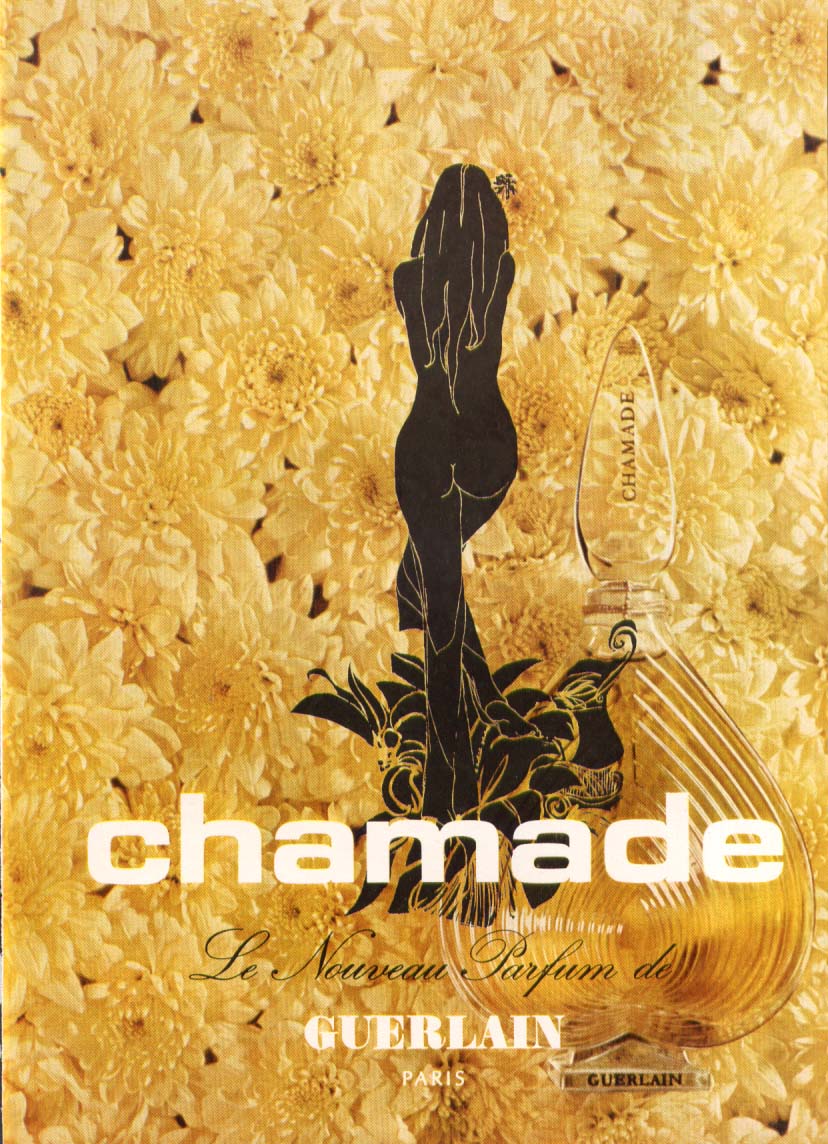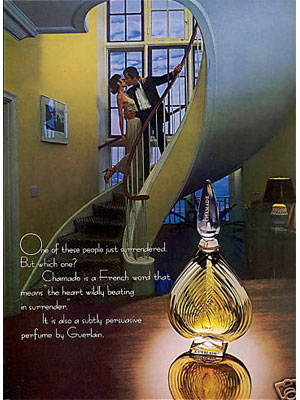



Chamade is one of the great classics of perfumery. Period.
Today, it seems a scent partially out of time, a bit "old" and a bit "modern" at the same time, but due to this ambivalence Chamade has a great value, because it was built with a particular mindset: being "modern" without abandoning the "old" style.
Today, a casual observer would say: "Ok, it's a good women's perfume, but it's a little old-fashioned way".
And it is precisely that "good-but-a-little-old-fashioned" that reveals many things: Chamade was one of the first perfumes to explore the fruity side, and not only the flowery one.
Today, this paradigm fruits-flowers is granted: in that time, in 1969, it was almost revolutionary.
( Note: about recognizing, batch-by-batch, year-by-year, all GUERLAIN perfumes, see here )
( For an introduction to Chamade, read Monsieur Guerlain's review here )
In this test we have two bottles of "Special Edition" Eau de Toilette, the first is a very rare "Silver ZigZag" box, Copyright Guerlain 1980, with an unusual batch number 0AB3 that can be (presumably) traced back to 1980, in excellent condition; the second bottle it is also a special edition, in a "Marble" box type, instead of the usual "Black and Gold" , with a batch number "MHxxx" dating back to 1990. This bottle is in very good condition, too.
 |
| Chamade year 1980 (left) VS. Chamade year 1990 (right) |
This test is particularly significant because both bottles are "spray" versions (not "splash"), and have been stored inside the boxes, so presumably there were no excessive evaporation or alterations.
What is the result of the test? Apparently both versions should smell the same but, on the contrary, the difference is considerable; especially in the drydown.
The top notes are absolutely identical, and the heart ones too. But here, at the end of the heart notes, at the beginning of the drydown, differences begin to emerge.
The drydown of the earlier bottle (1980) is much more intense, rich and long. The drydown of the 1990 bottle is great in itself, but compared to that of 1980, seems more light, less rich, somewhat evanescent.
What is most significant element?
It's that the "recent" bottle (1990) taken alone, smells great; much better than most of today perfumes,
but compared to the "old" one (1980) appears less solid. This makes us understand why each "vintage" perfume should always be compared having a reference point, because otherwise the judgment might be biased.
At the end of this lesson there is always the same motto: "The older, the better", provided that perfumes have been stored in excellent conditions.
So, the advice is also always the same: if you can find a great "vintage" perfume do not miss it.
 |
| Copyright Guerlain 1980 Batch number (a pretty unusual one) 0AB3 = year 1980. Some bottles -usually small ones- had a different batch-coding during late Seventies-early Eighties. |
 |
| Box on the left Batch number MHxxxx = year 1990 |
 |
| Chamade 1990 (left) Chamade 1980 (right) |
 |
| Chamade 1990 (left) Chamade 1980 (right) |
 |
| Blind test: Chamade OLD (1980) VS Chamade NEW (1990) |
---------------------------------------------------------------------------------------------------------
Chamade (1969) è uno dei grandi classici della profumeria. Visto oggi, è un profumo che sembra antico e moderno al tempo stesso, ma proprio per questo ha un suo grande valore storico. Come direbbe un osservatore distratto: Chamade un bel profumo da donna, ma un pò vecchia maniera.
Ed è proprio quel "un pò" che rivela molte cose: Chamade è stato uno dei primi profumi ad esplorare le note fruttate e non più solo quelle fiorite. Oggi questo paradigma frutti-fiori è scontato, all'epoca, nel 1969, era quasi rivoluzionario.
In questo test abbiamo due flaconi "Special Edition" di Eau de Toilette, uno molto raro del 1980 nella sua scatola "Silver ZigZag", con un inusuale numero di codice 0AB3 che si può far risalire proprio al 1980; in ottimo stato di conservazione; il secondo flacone è anche esso in edizione speciale in una scatola tipo "Marble" anzichè la solita "Black and Gold", con un numero di lotto MHxxx risalente al 1990. Anche questa in ottime condizioni. Il test è particolarmente significativo in quanto ambedue i flaconi sono in versione spray e sono state conservati in scatola, quindi presumibilmente non vi sono state eccessive evaporazioni o alterazioni.
Cosa viene fuori dal test? apparentemente i due profumi dovrebbero essere identici e invece no, la differenza è notevole, sopratutto nella conclusione. Le note di testa sono assolutamente identiche, e quelle centrali anche, per la maggior parte. Ma proprio qui, al termine delle note centrali e con l'inizio del drydown, cominciano a uscire le differenze. Il drydown dell'edizione del 1980 è assai più intenso, ricco, prolungato.
Il drydown dell'edizione 1990 è ottimo in sè, ma paragonato a quello del 1980 sembra più leggero ed evanescente.
Il drydown dell'edizione 1990 è ottimo in sè, ma paragonato a quello del 1980 sembra più leggero ed evanescente.
La cosa più paradossale quale è? E' che l'edizione "recente" (1990) presa da sola sembra fantastica, ma paragonata a quella più antica (1980) appare inferiore. Questo fa capire come ogni profumo "vintage" andrebbe sempre paragonato avendo un punto di riferimento, perchè altrimenti il giudizio potrebbe essere parziale.
Alla fine l'insegnamento che se ne trae è sempre lo stesso: per molti profumi: "the older, the better", a patto che siano stati conservati in condizioni impeccabili. Per cui, il consiglio è parimenti sempre lo stesso: se riuscite a trovare un grande profumo "vintagE, non fatevelo sfuggire.










0 comments:
Post a Comment